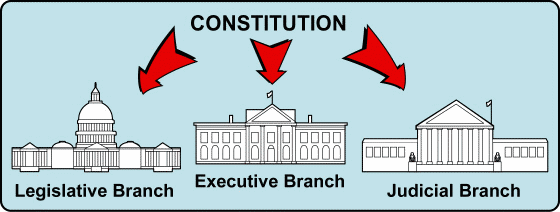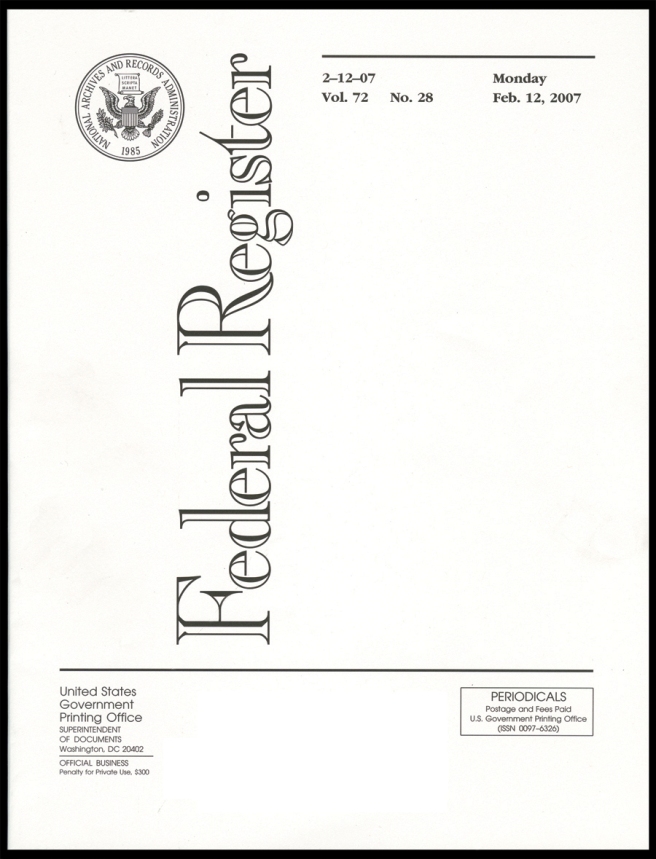ADMINISTRATIVE REGULATIONS (THE FOURTH BRANCH OF GOVERNMENT)
Recall that administrative agencies are part of the Executive Branch, where the President or governor sit. But there are so many agencies, and they produce so many regulations or rules, and also produce administrative decisions, that they are sometimes considered an entire branch of government by themselves!

The federal government publishes the Federal Register every business day of the year in order to announce proposed changes to federal agency rules and announce final rules after the agencies take public comment on such proposals. That should tell us something about how often such rules are changed! Of course, in the new Trump administration, there has been an executive order ( which slowed the agencies’ rules by requiring them to repeal two rules for each new rule they produce). E.O. 13771. After a federal regulation becomes final, it is published again in the Code of Federal Regulations. (CFR)

States mirror the federal structure, and titles, even. In Massachusetts, our state agencies publish proposed and final regulations in the Massachusetts Register. After our state regulations become final, they are republished in the Code of Massachusetts Regulations (CMR). Unlike the federal government, our state does not publish an entire set of either online for free. However, you can find MOST of the CMR on the Trial Courts Library website. But there are gaps where a few agencies have not provided the text of their regulations in digital format to the library or posted them. You can find a printed copy in many public libraries, certainly in the Boston Public Library’s main branch, or any of the Trial Court libraries.
Federal agencies get their power to regulate from Congress (just as state agencies derive power to regulate from state legislatures). Basically, the law-makers pass a law that is too complex, or sometimes, too much a political hot-potato, for them or their staff to deal with. Imagine when Congress passed the Clean Air Act (they did, honest!). There are all sorts of details in the law, such as setting the allowable levels of various pollutants, which require the expertise of biologists, health specialists, environmentalists and/or engineers. For example:
[What is a safe level of sulfur dioxide emission into the air? What will be the effect on humans and the environment in the long-term?]
[What would be the effect on the fish in the lakes if the coal power plants continued to emit mercury in their smoke, and rain comes from clouds formed with such smoke?]
[What will be the health effects on adults, pregnant women, their unborn babies, and children if these people eat fish from lakes where mercury-containing rain fell?]
[How much will it cost coal-fired power plants to reduce the mercury and sulfur dioxide emissions to acceptable levels, compared to the health risks? Are there feasible alternative technologies to clean the emissions or the water or fish?]
There are also political hot-button issues where it is much more convenient for legislators to pass the policy-making to the agency rather than face their constituents or donors. You can see just from the list of questions above, how politically charged the problems of controlling air pollution can become. And, rather than focus on data and letting that drive decisions, most politicians (and their constituents) are driven by emotions and headlines. It is much more convenient for the legislators to leave it to the agency to set limits on coal fired power plants, thus increasing the cost of electricity and possibly reducing the demand for certain types of coal. Then the legislators can blame the effects on the agency, and divert any blame from themselves.

This sort of double-dealing is how administrative agencies, though given the task by Congress of implementing laws that Congress itself passes, become the Congress’ whipping boy for doing their job. Congress has a very odd and mixed relationship with the various administrative agencies!
If you think about it, it is very odd that agencies, whose staff are NEVER voted for, end up making so much law! This is one of the things that drives some folks crazy about how our administrative law works… The agencies have no power to create regulations except what Congress (or state legislators) delegate to them. There are specific sections in the law where these delegations are made, either very narrow and specific or broad and vague. But without those delegating clauses, an agency has no authority to pass a regulation at all! Agencies also rely on these delegations to enforce the regulations. The I.R.S. would have no authority to track down tax cheats. The EPA would have no power to levy fines against polluters, without such delegations. State agencies, same deal!

Agencies are required to look for public input as they move to create new regulations (sometimes just called rules). The Administrative Procedure Act, 5 U.S.C. §553 requires federal agencies to publish notice of most proposed rules in the Federal Register, seeking input from the public, and allow a minimum of 30 days for input. The reasoning is that there needs to be SOME way for the public to have input to the law-making process since they do not vote for the agency personnel. Also, it helps broaden the agency’s information on whatever topic.
There are a number of places online to locate these input requests, but the last link above is probably the easiest for reading such announcements and entering your comments. This version of the website really tries to make it fun and easy to read regulations and proposed regulations, and send comments. You can also easily see what others have said in comments, which is interesting and can inform your own comments!
For instance, there is a recently closed proposal for a rule to loosen the requirements for medical professionals allowed to bill Medicare for creating prosthetics and custom orthotics, which could reduce costs and make such items more widely available, so long as the quality is maintained. This suggested regulation change received more than 5,000 comments from members of the public! You can read them online here.
I notice that many of the comments were posted well after the official end of the comment period. That is because agency personnel gathered input from similar source and “clumped” it for ease of processing. The dates of the individual comments are within the comment period. Many of the comments include information in the subject line that allows you to understand something about the individual or organization commenting, so you can decide with that bit of information which of the posts might be most interesting to open. Somebody at the agency, however, had to open read and process ALL of the comments!

The first in the list as I read opens to show more than 50 form letters, which must have been generated by an emailed or website-posted appeal to an organization of occupational therapists. The individual letters are dated before the deadline and the collection was just posted recently after being collected as a group to post for the convenience of readers. If you are a member of any environmental, gun rights, civil rights, etc. type of organization, you probably have received appeals to contact your legislator and various agencies in response to laws and regulations.
The piles of “form comments” you see here are a fairly recent development. It raises an interesting an somewhat troubling issue for administrative agencies. They invite public input, yet the decision-making is NOT a democratic process – they are not counting comments on various sides of the issue and allowing the numbers to decide the outcome for the proposed regulation. If you flip through the results, skipping over the collected files, you will find more informative comments which tend to alert the regulators to potential impacts, costs, or problems with the language of the proposed rule. This is the reason for the requirement that regulators seek public input. Occasionally, an agency will invite comment from a specialist or interested group. When I see a posting that includes “written testimony” and “supporting documents,” I tend to think that some or all of these came from invited comments. (look on the right margin of the screen, as you scroll down, in the green section, “Enhanced Content.”)

(see MoveOn petition with comments)
After a proposed regulation has been posted, and the agency has received comments, and the 30 days (or longer) has passed, the agency must post a follow-up in the Federal Register, whether if it is only to withdraw the original proposal, or to post the final version of the adopted regulation. Here, for instance, is an announcement in 2016 of final changes to the 2013 Mortgage Rules under Real Estate Settlement Procedures Act and the Truth in Lending Act. The agency includes a link to the 9 comments received following the original proposal, comments and testing that the agency did.
Sometimes, as you will see if you follow the link just above, you will see agencies doing research and testing in addition to simply requesting public input, before deciding on new regulations. Agencies include staff with specialized expertise in the subject area, and they may do studies of various kinds before deciding about regulations. When the agency decides on a final regulation, they must include information explaining WHY they decided on the final form they chose. This may include a summary of the comments received, and which had impact on the agency decision-making. It should not simply ignore comments, but need not address each individual comment.

Restaurants are governed by many regulations
Not many individuals realize that their lives are governed by agency rules on a daily basis. They may read in the papers about agency regulations interfering with business, but they may never understand that these regulations affect their own lives every day. Once in a while media will run one or two stories on regulations that benefit business. And you have only to think for a moment to see how many of the regulations that this article discussing regulations troubling restaurants often benefit you or restaurant employees! For instance, the number one headache in the linked survey of restaurant owners was the Affordable Care Act, requiring employers to provide health care to workers – and this does not directly affect restaurant consumers, it will eventually increase prices. However, it will also benefit the workers at the restaurants and generally increase the health of the workers and reliability of the sanitation of food preparation when food handlers can affordably receive health and preventative care.

The number two concern was data security! Requirements that restaurants and other vendors secure the credit card information of their patrons directly benefits those of us who want to eat out and pay with plastic. Number three concern was dietary guidelines, which may or may not strike you as a benefit. It is interesting and somewhat entertaining to see the illustration in the article which shows the changes in guidelines over the decades! However, menu labeling, the next concern, may be more assistance to those who eat out with dietary restrictions, or allergies. Fifth on the list is food waste, which is a general concern for all members of society. It is interesting to read here that increasing improvements in moving leftovers from landfills to feeding the needy originated in tax reforms! Another tax reform of interest appears to be creating restaurant jobs for groups such as veterans, food-stamp recipients and vocational rehab trainees, who have traditionally been under-employed. So, the article about regulations impacting restaurant owners makes a convenient check for how those same regulations impact restaurant employees and consumers as well.
And obviously, restaurants are subject to stringent regulations on the state level governing health and sanitation. We consumers rely on these rules, enforced by inspectors, in order to know that the restaurants and food trucks we eat at are clean and reliable. In 1906, with grassroots movements and Upton Sinclair’s book The Jungle, there was passage of the Pure Foods Act. And in 1938, the Food, Drug and Cosmetic Act was passed to address shortcomings in the Pure Foods Act.

Clearly, regulations can be beneficial for consumers or the wider public even while they may be harsh on some businesses. Some regulations benefit one type of business while they disadvantage another type. It is important to know that YOU have a right to give your opinion to state and federal agencies as they promulgate regulations. The federal rules website is probably the most convenient way to track and comment on federal proposed regulation. You can search this site by keywords, or by agency, or look at the highlights.
Massachusetts does not offer such a centralized posting and comments website. The Massachusetts Register is published in print every workday with proposed state regulations, and information on how to send comments. Just like federal agencies, Massachusetts agencies must allow at least 30 days for comments following publication of a proposed rule. The Department of Environmental Protection (DEP) provides a pretty good interface. Department of Education, has a good website for their rules, the Secretary of State issues a wide variety of notices for different types of rules, and the Department of Revenue includes announcements of proposed rules for comments.

Printed Code of Federal Regulations. An entire set is published each year, in 4 chunks, and covered with a new color, making it easier to see which are the new volumes.
After a rule has been announced in final form in either the Federal Register or the Massachusetts (or other state) Register, it will then be fitted into the order of the Code of Federal Regulations (CFR) or the Code of Massachusetts (or other state) Regulations (CMR).
The Code of Federal Regulations is printed in paperback, all new each year, so if you see it in print, above is what you would see. Each year is covered in a different color. This is important and helpful because the set is updated in four chunks throughout the year. Agencies assigned Titles 1 – 26 should have their regulations updated for the year in time to print new volumes for January 2. But it often happens that agencies miss the deadline. Notice above that there are a few pink volumes among the new aqua blue volumes. At least this alerts the user that they need to update the rules in the book! This is one reason most users prefer to use the e-CFR online with a service that announces how current they are!

Recall that “code” means it is an organized, complex body of law set in order by subject. We earlier looked at the United States Code (the federal statutes). In all cases, you can use the fact that a code has been set in subject order to help you find what you want, and to be certain you have found all the related, relevant law that you need because they will probably sit nearby in the Code. This is where you want to use the tables of contents at the beginnings of chapters or titles, to browse around and see the related material. You can also “back up” and get a broader view of the code.
Keep in mind when people talk about “regulations” that, like all law, it depends on who is affected whether it’s a benefit or a burden. And remember that politicians love to blame the agencies for unpopular law! They offload the “hot potatoes” onto the administrative agencies, even when it is THEY who passed the laws, or signed them, that gave the agencies the power to enact or enforce the regulations! It makes no sense to blame “regulations” as a class of law for problems faced by business or individuals.

